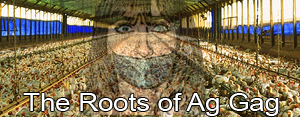On Thanksgiving Sunday 2006, President George W. Bush signed into law the Animal Enterprise Terrorism Act (AETA), a breathtaking statute designed to make illegal the exercise of free speech against animal torture, and to brand animal activists as terrorists.
 It is popular to say AETA passed unanimously in both houses of Congress. But procedural maneuvers were used to prevent actual votes. It passed the Senate by “unanimous consent” of those few present on the floor; no vote was taken. In the House it passed by acclamation after a “suspension of the rules”; six members were in attendance.
It is popular to say AETA passed unanimously in both houses of Congress. But procedural maneuvers were used to prevent actual votes. It passed the Senate by “unanimous consent” of those few present on the floor; no vote was taken. In the House it passed by acclamation after a “suspension of the rules”; six members were in attendance.
The broad, unconstitutional sweep of AETA has intimidated activists, had a chilling effect on speech and given courage and comfort to states that enact Ag Gag laws to prevent whistleblowers and citizen witnesses from reporting animal torture and illegal activities at animal agriculture operations. (see EarthDesk, Oct. 15, July 22 and April 27.) The success of AETA’s agribusiness proponents on the federal level has emboldened them in their campaign to hide animal practices behind a cloak of ever more restrictive, and unconstitutional, state laws.
Among other things, AETA makes it is a federal crime to engage in interstate travel or communications that have a negative impact on the profitability of an “animal enterprise,” a term not defined by the statute. For example, using the Internet or U.S. Postal Service to organize a successful economic boycott against a Concentrated Animal Feeding Operation (CAFO), could result in prosecution by the U.S. Attorney General, and eventual imprisonment.
Congressman Steve Israel (D-NY) criticized AETA in his remarks in the House:
This bill criminalizes conduct that “intentionally damages or causes the loss of any real or personal property,” however, the bill fails to define what “real or personal property” means. As a result, legitimate advocacy–such as a boycott, protest, or mail campaign–that causes an animal enterprise to merely lose profits could be criminalized.
The law goes farther. Because it does not define an “animal enterprise,” a citizen can even be prosecuted for interfering with illegal activities.
Congressman Israel:
It also fails to adequately define the term “animal enterprise.” Nothing in the current definition requires that an enterprise be lawful. Therefore, investigations into unlawful animal enterprises, such as animal fighting organizations or illegal puppy mills, could be deterred as employees, citizens, and legitimate animal activists may be afraid to cooperate or provide information to law enforcement agencies for fear of prosecution under the terms of this bill.
In its mission to root out related protest of any kind, AETA goes still farther. It created the new crime of conspiring to intimidate an “intimate partner” of a person who has a “connection” to an animal enterprise. The law does not define the terms “connection” or “intimate partner.”
AETA effectively criminalizes the very purpose of the First Amendment – changing people’s minds. (Center for Constitutional Rights)
AETA includes a range of other crimes, most of which, such as homicide, were already outlawed by other statutes.
Its zealous co-sponsors, Senators Dianne Feinstein (D-CA) and James Inhoffe (R-OK), realized the act’s vague standards would prompt constitutional objections. As a remedy, they added Section (e), “Rules of Construction,” which states, “Nothing in this section shall be construed” to violate “the First Amendment to the Constitution.”

In Case the U.S. Constitution Gets in the Way. The bill’s sponsors were so convinced they had exceeded constitutional authority, they added language to the AETA decreeing in advance that the law complies with the First Amendment. Senator Dianne Feinstein: “I fully recognize that peaceful picketing and public demonstrations against animal testing should be recognized as part of our valuable and sacred right to free expression. For this reason, all conduct protected by the First Amendment is expressly excluded from the scope of this legislation.”
In other words, in the view of the bill’s authors, AETA, not the United States Constitution, defines the limits of the First Amendment.
In Blum v. Holder, a case that challenges AETA, the Center for Constitutional Rights wrote:
The AETA fails to define key terms, but its plain language criminalizes core political advocacy and speech that are protected by the First Amendment. For example, it punishes otherwise lawful and innocuous speech or advocacy that causes a business that uses or sells animal products to lose profit, even where that lost profit comes from a decrease in sales in reaction to public advocacy. Thus, AETA effectively criminalizes the very purpose of the First Amendment – changing people’s minds.
In an amicus brief, the American Civil Liberties Union of Massachusetts wrote:
AETA does not enumerate what conduct it prohibits. Rather, it . . . offers, in its stead, a vague “rule of construction” that seems to presume that ordinary Americans are First Amendment scholars. . .
[It] threatens expression protected by the First Amendment. Strident and even coercive speech, including speech that harms businesses, is a protected form of expression with a storied history. It has been used, for example, by civil rights protestors, organized labor, and anti-apartheid advocates. With each additional day of discriminatory enforcement, the AETA is an affront to that history.
The New York City Bar Association boiled it down:
On a plain reading of the statute, demonstrators picketing in front of a local pet store could be prosecuted if the store lost sales or business goodwill as a result.
. . . Appending the label of terrorism to AETA’s title was apparently intended to buttress the statute from opponents who were concerned about its encroachment on protected First Amendment activity. However, designating speech as “terrorism” does not permit its suppression.
In his excellent analysis, Pace Law Professor David Cassuto wrote on his Animal Blawg:
AETA (re)criminalizes conduct that neither causes nor threatens bodily harm, economic damage, or even non-violent physical obstruction, and which is already illegal under existing state and federal law. Such redundancy lacks any rational basis. It seems more concerned with stifling dissent than protecting the public from terrorism.
Terrorism usually refers to the intimidation (terrorizing) of a civilian population through mass destruction, assassination or kidnapping. A terrorist is someone who commits such acts. Classifying standard-issue crimes – including civil disobedience – as terrorism conflates crime (the breach of a legal duty), and terrorism (the use or threat of violence to intimidate or cause panic, especially as a means of affecting political conduct). All terrorists are criminals but not all criminals are terrorists. Merging the two erodes normative protections that our founders painstakingly created to safeguard us from tyranny.
Under AETA, well-meaning citizens peacefully trying to bring about social change become the domestic equivalent of enemy combatants. The danger here is not just that people . . . will become stigmatized and get imprisoned for long periods, though that by itself would be problem enough. It is also that over time, the term terrorism will lose its meaning.
But on the occasion of AETA’s signing by President Bush in 2006, Senator Feinstein boasted:
The new law enhances the ability of the U.S. Department of Justice to prosecute animal rights extremists who utilize violence and terroristic threats, while expressly preserving the First Amendment rights of activists to peacefully protest and boycott lawfully.
Three years later, the AETA 4, Joseph Buddenberg, Maryam Khajavi, Nathan Pope and Adriana Stumpo, from Feinstein’s home state of California, were arrested by the FBI and indicted for:
[P]rotesting, chalking the sidewalk, chanting and leafleting, and the alleged use of “the Internet to find information on bio-medical researchers.” (Center for Constitutional Rights)
Senator Feinstein’s office had not comment on the case.









